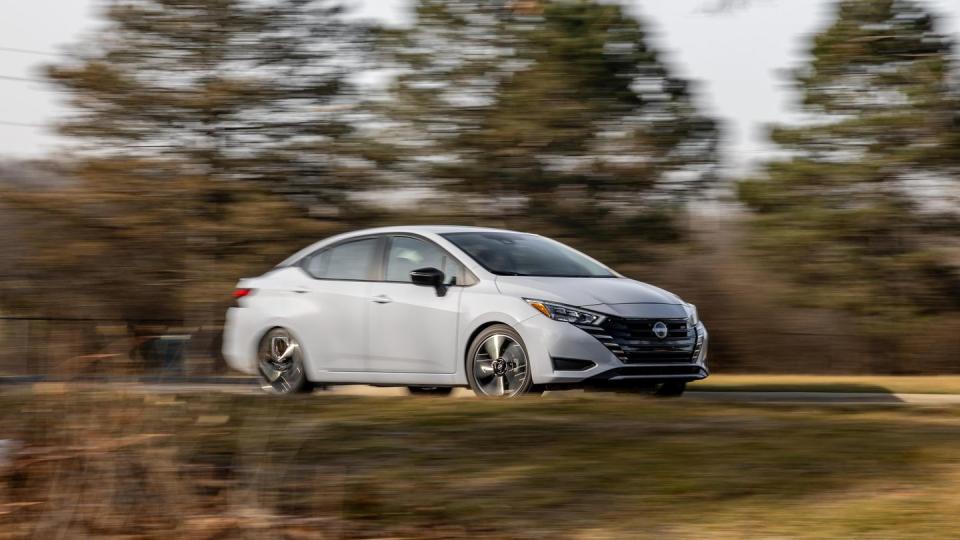Tested: 2023 Nissan Versa Is Cheap without Being Bare-Bones

Cheap doesn't mean what it used to. But with the average new car now costing well over $45,000, the 2023 Nissan Versa definitely still qualifies. It starts at $16,825 for the base S trim with a five-speed manual transmission, making it the cheapest new car you can buy in the U.S. for 2023.
The Versa you see here is not that Versa. This is the loaded SR model, which looks considerably flashier and costs quite a bit more. Yet it still starts at less than $21,000 and carries a surprising amount of equipment for the price. (Remember, even a base Honda Civic is over $26,000 these days.) A refresh for 2023 improves the Versa's looks significantly thanks to a cool new grille, reshaped headlights and taillights, and trim-specific 17-inch wheels. Our test car's new $395 Gray Sky Pearl exterior color doesn't hurt matters either.
Inside, the Versa is not as low-rent as you might expect. The dashboard features some soft-touch surfaces with orange contrasting stitching, the seat fabric has red accents, and the gauge-cluster and infotainment screens are large and feature modern-enough graphics. We were pleasantly surprised to find automatic climate control, heated front seats, and a push-button start. A full cadre of driver-assistance features includes adaptive cruise control, blind-spot monitoring, and rear parking sensors. Many of these features are not available in the Versa's only true subcompact competitor, the Kia Rio, which is similarly sized and occupies a similar price range.

Despite the spruced-up interior and exterior, the front-wheel-drive Versa sedan's underpinnings haven't changed much since this generation was introduced for 2020. But the chassis remains perfectly satisfying for a small car like this, with good body control and a reasonably refined ride on bumpy roads. The steering is overly light and doesn't offer much feedback, but the 2690-pound Versa feels agile, managing an impressive 0.89 g on our skidpad. It also stops from 70 mph in 173 feet, which beats the 2021 Rio hatchback we tested by 17 feet.
The only real compromise is in the engine room, where a 122-hp 1.6-liter inline-four buzzes loudly to get the Versa up to speed. While many of today's continuously variable automatic transmissions reduce that rubber-band sensation of delayed acceleration, the Versa's transmission still suffers from this effect. A 9.5-second sprint to 60 mph makes it one of the slowest cars we've tested in recent memory. The Rio beats it to that mark by nearly a second, and the Kia's CVT feels more responsive. We're curious if the base Versa's manual transmission would improve matters, but unfortunately the stick shift can't be combined with the nicer SV and SR trim levels.

The engine works so hard that we weren't able to match the Versa's 40-mpg EPA highway-fuel-economy estimate. We managed only 36 mpg on our real-world 75-mph loop. That's 3 mpg below the Rio, and even many mid-size sedans beat the Versa, such as Nissan's own Altima, which managed a 41-mpg result in our test despite its extra size, larger engine, and all-wheel drive.
There are many new cars that are more compelling than the Nissan Versa—they just cost a whole lot more. There's always the argument that you get more bang for your buck from a used car than a new one, but in today's volatile car market that's less of a guarantee than it used to be. Sure, the Nissan is cheap, small, and slow, but it provides shoppers with the modern features and contemporary styling that make new cars appealing in the first place. The Versa simply begs the question: What does cheap mean to you?
You Might Also Like

 Yahoo Autos
Yahoo Autos 